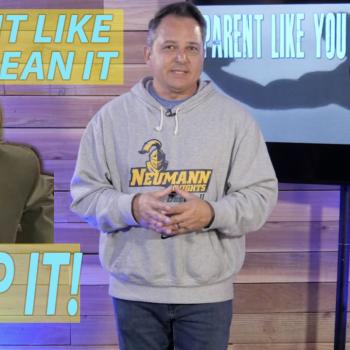 Blending Your StepFamily 40: Parenting Preschoolers During A Divorce or Separation Play Now | Play in Popup | Download
Blending Your StepFamily 40: Parenting Preschoolers During A Divorce or Separation Play Now | Play in Popup | DownloadWe’ve been talking about the age of your child when the divorce happens so that you know how to best help your little one. The age of the child is of concern for how to help your child to cope with the divorce and the changes in their surroundings. Even babies sense things are not right when there is tension between his parents.
What a baby needs from you is different from what a preschooler needs so knowing how to best help your child in the development stage they are in will help them not get stuck emotionally and will improve their probability of feeling secure, loved and wanted.
My son was a preschooler at the time of my divorce so this stage is especially close to my heart.
- This is a time when the child begins to model behaviors from their parents, in particular, the same-gender parent.
- Conscience has developed and they usually know right from wrong.
- They believe the world revolves around them. Due to this, they may feel the divorce is their fault and they may feel guilty.
- They don’t talk about their feelings much but because of the divorce, they may feel sadness and fear. The fear comes from a place of concern that they will not be safe and taken care of or that the remaining parent might leave. They experience sadness over their parent moving out of the home and their family structure not being what they have known it to be.
How can we help our preschooler to cope with the divorce?
Play therapy has been shown to help kids of this age to process their feelings and be able to move forward. My son went to play therapy once a week for approximately 4 months. He would act out with the toys they had provided different scenarios in our family life and situations that were bothering him. He was expressing himself through play and releasing the tension that had built up. Studies show that over 70% of kids involved with play therapy have a positive change for the better. I can attest that my child was significantly helped.
If you cannot take your child to a professional for play therapy, you can certainly promote it at home. Encourage and have your children act out their feelings through puppet plays or to their imaginary friend. This is a good example of what play therapy is but you can learn more by doing a google search online.
Besides play therapy, what else can we do to help our preschooler to adjust to their new home life and divorce?
We must realize that our child needs to grieve the loss of his family, as he once knew it. So he will go through the various stages of grief such as sadness, anger, denial, acceptance and then back again through the feelings.
One day will be good but the very next day may be bad. Children will take breaks from their grieving and forget about it for a while only to return to it again.
Just like we need to grieve the loss of our marriage, our little ones need to be allowed to grieve the loss of their family, as they knew it. What’s hard for our kids is that when they are with Mommy, they are missing Daddy and vice versa. I remember one little three year old that I was involved with after his parents divorced. He became extremely upset one day and bellowed from the depths of his very being “I lost my mommy”. He was angry and sad both at the same time. His Daddy allowed him to grieve and express his frustration and affirmed to him that he would always be there for him. That little guy has grown up and is happy, healthy and well-adjusted.
Another way to help our preschooler is to continue to be consistent with routines and boundaries and lavish lots of affection upon them. When they express anger or sadness, express love and concern back regarding their feelings. When they say, “I lost my mommy” don’t minimize it but help them to process truth. If he won’t be seeing mommy again, don’t tell him he will but allow him to express his sadness and anger over her absence. Be compassionate and loving so that your child feels safe in sharing his feelings with you.
This can be a very difficult time for us parents because we want to diminish our child’s pain. If we could, we could take it all away. But we can’t and we can’t control their other parent. What we can do is consistently be there for our child so they feel they have safety and security with you.
Answer your preschooler’s questions simply and honestly, it’s not so much about what you tell them, as it is what you express to them. Your actions and emotions are where they will take their cues. If you are emotionally distraught, he will not feel safe. Children model the adults around them, so if you scream and cry, he may not only mimic your actions, but he will not adjust very well to the separation. You don’t need to always be happy but try to stay calm. That’s the key. It’s okay to cry in front of your child especially if he finds you crying. You can just say, “Mommy is sad because Daddy is not here” or “Daddy is sad because Mommy is not here”. Remaining calm even in the midst of our pain is what will help our kids to better adjust.
Pray for your child and with your child.
Small children have a natural inclination to believe in God.
Teach them to call upon God when they feel sad or mad. Change is hard for everyone but especially hard on children so it’s up to us to help them accept the changes.
Deuteronomy 33:27 says, “The eternal God is your refuge, and underneath are the everlasting arms.”
Just picture it: God holding His arms under you to hold you up, He is our divine protector and hiding place. Teach your little one this truth.
For more encouraging and engaging podcasts and videos, visit the E-Squared Media Network at www.e2medianetwork.com













